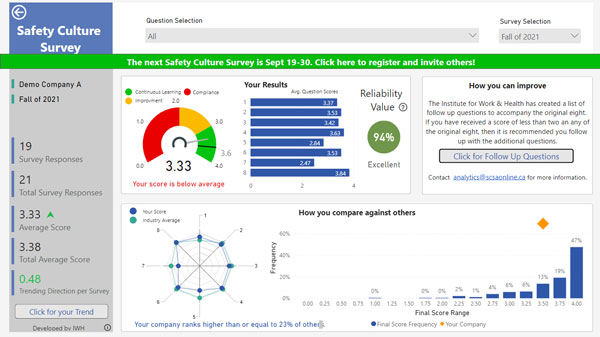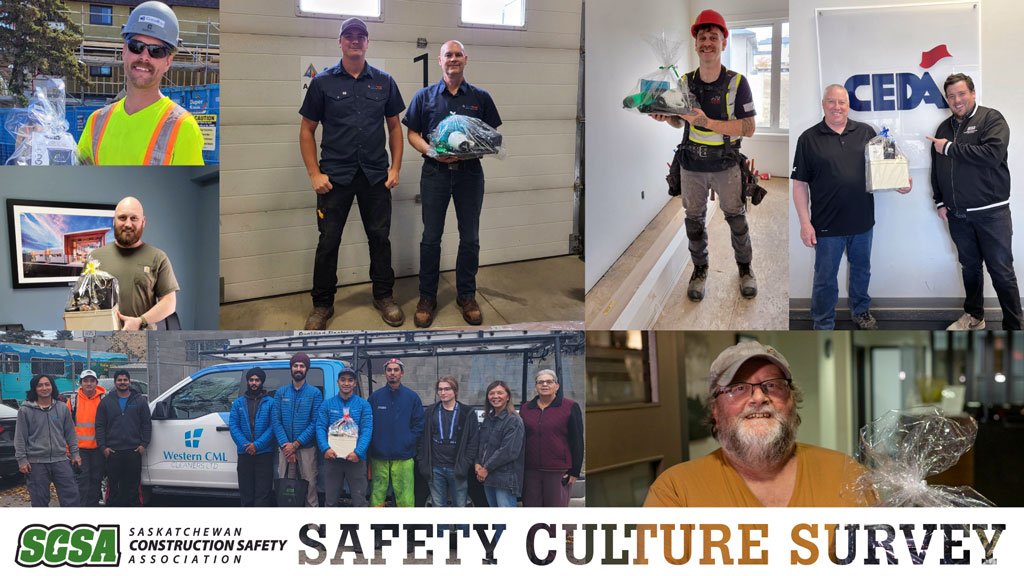An innovative new survey tool is being used by the to help companies identify hazards and prompt them to take steps to reduce injury risks.
The tool was developed by the SCSA in collaboration with , a Calgary-based company that specializes in health and safety data, research and machine learning. The firm collects data such as incident reports and uses it to drive safety initiatives to mitigate potential risk.
The survey is an eight-item questionnaire developed by the (IWH) and OntarioÔÇÖs prevention systems partners to assess values and beliefs around a companyÔÇÖs workplace culture. Data collected can be used to help identify where improvements need to be made.
The questionnaire was selected because it is concise, easy to administer and can be completed in a few minutes.
Over three years, EHS Analytics analyzed data from six rounds of the survey to gain insights to help reduce injuries at companies and yield key insights into the effectiveness of safety practices.
More than 800 SCSA-member companies have already participated in the initiative, making it the largest industry-wide survey of its kind.
ÔÇťHaving insights into oneÔÇÖs own company in a way that can predict incidents is a game changer,ÔÇŁ explained SCSA president Collin Pullar.
ÔÇťThis is a powerful Canadian-built tool, and we would love to see as many companies as possible use it and learn from it to prevent accidents within their workforces.ÔÇŁ

Surveys found there is a strong correlation between high survey scores and lower future lost-time injury rates.
The results enhance the ability of firms to benchmark their safety performance against industry standards and peers and identify areas where improvements can be made.
Past results have reiterated the effectiveness of a Certificate of Recognition that confirms a company is complying with established standards of the Occupational Health and Safety Act. It is often a pre-qualification for contractors working in the province and in public or private sectors.
The survey tool gives employees a chance to voice their thoughts about company safety culture and enables companies to predict areas that need improvement to prevent injuries and reduce claims, as well as compare their results over time to identify strengths and weaknesses.
Companies gain insight into their organization and how it compares in safety to other Saskatchewan construction companies.
Meanwhile, the survey helps companies identify any shortcomings in Canadian occupational health and safety performance that are not highly related to a lack of tools or equipment.
The survey is being done twice a year ÔÇô in the spring and fall. Everyone who participates is entered into draws to win SCSA prize packs. Winners are announced on social media.
Mohammad Khalkhali, data science team lead at EHS Analytics, said an analysis of the data showed the safety culture survey tool is a ÔÇťtrue leading indicatorÔÇŁ of a companyÔÇÖs safety performance.
ÔÇťFinding easy-to-measure, effective leading indicators in safety is incredibly challenging, and the safety culture survey provides companies with the ability to foresee and mitigate potential hazards before they result in incidents. Leading indicators are often considered the Holy Grail in safety for predicting risk, and this tool achieves that goal.ÔÇŁ
The idea for the initiative evolved several years ago when the SCSA began looking for a tool to measure the occupational health and safety culture of its firms beyond workersÔÇÖ compensation claim rates, which are generally considered to be lagging indicators of performance. The organization was looking for ways to assess safety culture that would predict future performance and, in the end, decided to use the questionnaire developed by the IWH.
Participation is voluntary. Members then get access to a dashboard that allows them to see their firmÔÇÖs results for each of the eight survey questions, as well as other safety performance metrics such as compensation board data, claims, premiums, surcharges and discounts, and training records. All results are anonymous.
The dashboard has a firmÔÇÖs overall score and a guide to interpret the figures. Companies also receive average industry results and trends over time, broken down by firm size and three subsectors. By tracking the figures, companies can see how their score compares to peers, determine how to make an adjustment to their safety program, and monitor their performance over time.
IWH president Peter Smith said it is heartening to see health and safety organizations such as the SCSA use the questionnaire to both understand organizational health and safety practices over time and to better understand the relationships between these practices and safety outcomes in Saskatchewan.



Recent Comments
comments for this post are closed